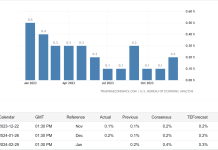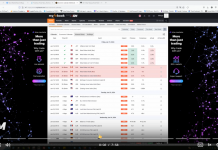 On 1 August 2019, the Polish Financial Supervision Authority (KNF) introduced a new category of investor – so called experienced retail client, who can take advantage of higher leverage at 1:100. However, this decision gives rise to numerous questions, asked not only by Polish brokerage houses, but above all by foreign investment firms providing their services in Poland. Most of those questions have been addressed by Paweł Frańczak, Managing Partner at PFLAW.PL on Comparic24tv in an interview conducted by Krzysztof Kamiński.
On 1 August 2019, the Polish Financial Supervision Authority (KNF) introduced a new category of investor – so called experienced retail client, who can take advantage of higher leverage at 1:100. However, this decision gives rise to numerous questions, asked not only by Polish brokerage houses, but above all by foreign investment firms providing their services in Poland. Most of those questions have been addressed by Paweł Frańczak, Managing Partner at PFLAW.PL on Comparic24tv in an interview conducted by Krzysztof Kamiński.
Krzysztof Kamiński: If you could refer to the discrepancies between ESMA’s statement and KNF’s decision?
Those events happened in fact within a short period of time. We found out about the very proposal to implement a product intervention from ESMA’s opinion, which was issued, as far as I remember, on 31 July. On the very next day KNF’s product intervention was announced. Those discrepancies concern in fact two issues: one of them is KNF’s proposal to establish another category (institution) of an experience client and contrary to ESMA’s product proposal, coming up with higher leverage for that type of client. Thus, KNF’s proposal liberalizes EMSA’s requirements. In its opinion, although the whole intervention is proportional, this departure from ESMA’s earlier product intervention is, in ESMA’s view, disproportional.
Another issue was the limitation of the territorial application of KNF’s product intervention, i.e. the possibility of its application by Polish brokerage firms operating abroad if there are no local product interventions. In ESMA’s opinion, this solution is disproportional and inappropriate – those two issues were criticized by ESMA as regards KNF’s product intervention.
However, it should be pointed out that ESMA’s criticism regarding those two issues is very imprecise. ESMA does not specify details of arguments why this solution proposed by KNF is inappropriate disproportionate. However, what is noteworthy and to what KNF referred to in its product intervention, such a drastic limitation as imposed by ESMA, in reality leads to a significant number of retail investors who are not eligible to become professional clients (and let me remind that professional clients include banks, insurance companies, investment firms) not being able to use higher leverage.
And those investors, unable to take advantage of higher leverage in the European Union, simply escape abroad, and here we are dealing with a situation where a large proportion of more experienced retail clients moved to Australian brokerage firms and they are using their services. KNF noticed that situation and introduced a solution in which it isolated a separate category of retail clients who are more experienced (allowing them to trade with a higher level of leverage at 1:100), hold either various certificates confirming their knowledge and experience such as a stockbroker’s license, a financial advisor’s licence or CFA qualifications. And apart from that, they proved that they had completed a specified number of transactions – experience gained in practice, while trading derivatives.
In my opinion this is a sensible solution. I don’t understand why ESMA finds it problematic that Polish brokers operating abroad apply local solutions if they are less restrictive than Polish solutions (Polish product intervention). In my opinion ESMA’s criticism in this area is inconsistent and illogical because in reality a Polish investment company operating abroad would have to apply more restrictive measures from its country of origin in a country where other brokers could offer higher leverage, which would deprive Polish brokers of the possibility to compete with investment companies operating on that market.
And as ESMA presented almost no justification of its criticism of KNF’s decision, it is hard to say what was the real reason for ESMA’s stance. Therefore, I think that KNF was right to uphold its original solutions.
KK: CySEC in Cyprus had a similar solution by introducing several categories of a client, including those that enabled higher levels of leverage. Do you think that KNF’s decision will make other regulators from European counties introduce their own solutions?
It’s hard to say. Many regulators have already introduced their own solutions and many of them coincide with what ESMA did. So, one could say that many European regulators chose the line of least resistance. Talking about Cyprus and CySEC, it has not applied a local product intervention in Cyprus. It has not been published and ESMA has not issued its opinion, so it seems that draft product intervention has not been sent to ESMA yet. So, it looks like Cypriots are still working on it. As far as I know, originally some solutions were proposed in Cyprus, whose solutions to some degree departed from ESMA, they were different to Polish requirements. They even, in a certain scope, tightened up requirements for margin when it comes to less experienced clients and they were more liberal to more experienced clients than ESMA’s solutions. It’s yet to be found out what their final shape will be.
As far as I know, relevant work will still carry on in Cyprus for at least several weeks. What is noteworthy is that CYsEC proposed solutions similar to KNF’s earlier ones before it made a decision on local product intervention – namely faced with no local product intervention and expiry of the Europe-wide ESMA’s product intervention, CySEC pointed it out to its brokerage firms that for the period before a local intervention is introduced, they should adhere to ESMA’s product intervention that had already expired and this will be in the clients’ best interest.
KK: Coming back to Poland. In light of KNF’s applicable regulations, since when will Polish brokerage houses be allowed to offer higher leverage to clients, thus classifying them as experienced ones?
The product intervention, as far as I know, was published in KNF’s Official Journal on 1 August and, based on the intervention, it came into effect the following day. So, in fact, Polish brokerage firms can apply the status of experienced clients to some of their investors based on the local product intervention. But, obviously, relevant conditions must be met, which, to me, are reasonable. They are strict but at the same time reasonable.
KK: They refer both to a client’s experience and knowledge, as it was specified that a client can have a particular certificate, e.g. stockbroker’s licence or specialist studies and obviously relevant experience.
These are interesting criteria, well thought-out. Even the required experience concerning the number of completed transactions, there are three variants. They provide for a different volume of transactions within a given period, a different number of transactions depending on various specific situations, thus giving both clients and brokerage firms extensive space to operate and at the same time those guidelines are quite precise, to my own and brokerage firms’ satisfaction.
KK: So, we can count as an advantage that somebody who only once opened a position of 1 mln EUR and closed it soon afterwards is not considered as an experienced client, but there is a specific requirement as to how many times it had to take place.
Well, it depends from whose position this is regarded as an advantage and probably there will be clients complaining that after all they entered transactions of such high value so, in fact, they should be considered experienced clients. But practice shows that some trading needs to be done on the markets to find out how those instruments work, post profit and losses, understand the risk involved. I think that the required number and volume of transactions makes possible for such clients to understand how this market works and figure out how those instruments work and the level of risk on this market and then make informed decision on further trading.
KK: And considering the new regulations, will Polish brokerage firms be allowed to offer higher leverage and consider only Polish residents as experienced clients or if a Polish brokerage firm operates in Germany, will it be allowed to classify clients as experienced ones as well?
In principle, if a Polish brokerage firm operates abroad, then based on that product intervention, it should apply that intervention only if there is no local product intervention. Then, based on the intervention itself, a Polish brokerage firm is obliged to apply Polish product intervention. On the other hand, the product intervention provides that the status of an experienced client can be granted only to a Polish resident.
So, in fact, even if there is no local intervention in place and a Polish brokerage firm would like to apply Polish product intervention, then it cannot classify such a client as an experienced one. Which in practice means that Polish brokerage firms abroad can apply Polish product intervention to the extent is coincides with ESMA’s previous intervention. So Polish brokerage firms are limited in enabling higher leverage to Polish resident only.
KK: And how about foreign investment firms operating in Poland under EU passporting services regulations? Do they fall under KNF’s decisions and can offer 1:100 leverage to Poles, or are they bound by decisions of their domestic regulators?
Here it’s important to specify on what basis those investment firms operate in Poland: whether is it cross-border activity or they are physically present in Poland and opened their branches based on passporting. As we know, there are two types of passports. The product intervention itself does not fully regulate that issue. Here general principles related to application of brokerage activity regulations in cross-border relations prevail. For sure, a firm operating here through a branch, under MiFID rules, is obliged to observe regulations that apply in Poland when it comes to providing brokerage services to clients. Thus, such a firm will have to apply local product intervention in Poland.
With regard to brokerage houses operating cross-border, it is probably more complicated as those entities are bound, in principle, by the requirements made by the regulator of their country of origin. However, it should be noted that in all countries in which CFDs are traded, local product interventions have been introduced. So, a brokerage firm operating from Cyprus in Poland cross-border, CySEC’s product intervention (being the expired ESMA’s intervention until a local one is introduced) will apply.
So in practice, a broker operating from Cyprus will be in a worse situation than Polish brokerage houses offering their products to Polish residents, as it will have to apply lower leverage and will not be allowed to grant the status of an experienced client as is the case with Polish brokerage houses.
KK: Ok, but as you have said, those ones operating as a branch will be allowed to offer the status of an experienced client?
That’s right. Those ones operating as a branch will have to apply Polish regulatory requirements, thus being allowed to grant the status of an experienced client. In the second part I mentioned brokerage firms operating cross-border, i.e. without having a Polish branch, but passported their brokerage activity based on the freedom to provide services in fact operating e.g. from Cyprus, winning client remotely and serving Polish clients from Cyprus.
KK: Could it, then, encourage all those brokerage firms operating cross-border, to open branches in our country?
It’s hard to say. So far, we haven’t discussed how the very possibility of classifying some retail clients as experienced ones by brokerage firms and offering them higher leverage will translate into revenues and real business, i.e. how brokerage firms and their clients will benefit from that. It will always boil down to a business decision. The possibility to offer higher leverage to some clients may translate into higher revenues and opening a branch involves some costs, both regulatory and financial. And those two factors need to be weighted out. For sure, the Polish market is large and some brokerage firms, because of this possibility to classify some clients as experienced ones in Poland, may consider opening a Polish branch.
KK: Last year, shortly after the product intervention was introduced by ESMA, some of Polish clients set off on a journey, obviously in inverted comas, by opening accounts far away from our country, often ending up in Australia. Do you think this could incentivize them to come back and open their accounts with Polish brokerage houses when allowed to use higher leverage?
I definitely think so. Obviously not all clients who came into contacts with CFDs moved to Australia. I assume these were clients who regularly traded CFDs, investing a larger part of their funds, so I would assume these are clients who stand a big chance of obtaining the status of an experienced client. So potentially this is already an incentive to move back to Poland. For sure, realization of investment targets with an Australian brokerage house involves some limitations, starting from a language barrier, to regulatory constraints, possibility of seeking claims and the very question of transferring funds to Australia and the costs involved and then withdrawing funds, taxes, etc.
I think that if such clients have a possibility to take advantage of the status of an experienced client, I think a large part of them will consider coming back to Polish brokerage houses with their investments. Which will be beneficial both for the whole sector and bring trust to financial markets, including the OTC market in Poland.
KK: One of the requirements to obtain the status of an experienced client is completion of 50 hours of training confirmed with a specific certificate. However, KNF itself is not fully precise as to who is allowed to issue such certificates. What’s your view on organisation of training and issuing certificates?
It’s true that KNF does not specify who can organize training. I think that the product intervention mentions a competent entity. It seems to me that there are no counter-indications that it could be brokerage houses. Most probably this will be subject to clarifications by the brokerage houses with KNF so that there are no uncertainties. However, regardless of whether it is done by brokerage houses or independent training companies, I can see a big advantage to it.
First, it will have a big impact on the level of education of clients of the Polish brokerage services market as such, giving an extra boost both for training companies and clients to acquire knowledge, so I think this will result in increased awareness on investing in financial instruments in Poland. And another thing is that we are dealing with some emerging business – obviously brokerage houses will want to run such training as this will open an new way of winning retail clients and classifying them as experienced ones and training companies will provide their paid offer to retail clients so that they can submit it to investment firms. So, this created spaces in Poland for the development of training business. It exists, though, but I have the impression that it was stronger in the past.
Footage with the whole interview in the Polish language is available below.
Comparic Group, with its team of top experts in financial markets and operating the widest range of financial, investment and business media in Poland, will be happy to assist you in entering the Polish market or launching your services in Poland. Feel free to contact us at redakcja@comparic.pl, tel. +48 731 244 014.
















